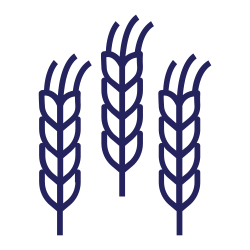Section Title
Combating Sprout Damage
- Wheat
- Winter Wheat
After an extremely dry summer that hindered crop development, farmers are now seeing late-season moisture that is impacting quality in areas all over Western Canada. Farmers have expressed significant concerns with sprouting in particular. We are releasing this information to help you with strategies to maximize your return. Concerned about sprouting? Here’s how to maximize your profit:
For many years Falling Number (FN) has been an important global requirement in wheat exports. In the last few years, Prairie farmers have seen it being increasingly used to determine the milling quality of their grain. This has created confusion for farmers as FN is not a grading factor, but is most often a contract requirement.
Falling number is a test conducted to indicate enzyme activity in the wheat which can be detrimental to the baking process. Higher falling number is better, and lower falling numbers are often linked to grain which has begun to sprout. If you expect that your harvest is going to be impacted by rain, here are four steps you can take to be proactive in checking your grain.
1. Segregate: If your harvest is stopped for several days due to a rain event, try to store wheat harvested after separately from wheat harvested earlier.
2. Get your falling number: Remember to take extra samples as a falling number test destroys the grain in the sample. Options for obtaining a falling number include:
- Enrol in the harvest sample program offered by the Canadian Grain Commission prior to November 30th.
- Take samples to multiple elevators.
- Consider sending a sample to an independent lab.
3. The art of the deal: If you know you have some wheat that is impacted by sprouting, try to market your high-quality wheat with the requirement of the buyer taking some lower quality too. Bring samples of both to the elevator and attempt to get a price based on the purchase of both high and low quality together.
4. Have a plan B: If you know your farm is going to have some wheat impacted by sprouting then look into contracting early with the feed market, the earlier the better. Forward contracting some wheat for feed can help move your lowest quality grain at a price that makes sense to your farm.

How to minimize sprouting in future crop years
If you are consistently finding that your grain is being rejected based on poor falling number, there are some management and genetic decisions you can make to avoid the conditions that cause sprouting.
- Harvest before mature grain is exposed to moisture: Seed as early as possible and choose varieties that are rated “early” or “very early”. If harvest conditions require swathing, try to leave taller straw for the windrow to rest on, this will help aeration of the windrow and encourage drying.
- Prevent lodging: When a crop lodges, the grain is at higher risk for moisture exposure. Again, genetics and management play a role in lodging. Chose a variety that is resistant to lodging. Plant growth regulators (PGRs) can also help to prevent lodging.
- Chose a variety that has higher resistance to sprouting.
- Only store dry grain: If harvested grain is not sufficiently dry, use a dryer to reduce moisture before storing in a bin or bag.
The effectiveness of any genetic and management decision will be influenced by the environment, so, if you are experiencing sprouting, the above options still may not provide complete protection.
Participate in the Harvest Sample Program!
The Harvest Sample Program is an excellent resource to help you market your grain. By participating, you’ll receive valuable information about grade and quality of your crop.
Concerned you’ve been graded unfairly?
If you’re concerned that you’re being downgraded unnecessarily and want to follow up on concerns regarding falling number, you can contact the Canadian Grain Commission at contact@grainscanada.ca or 1-800-853-6705. Also, please feel free to reach out to Manitoba Crop Alliance with any concerns.
Content generously provided by the Alberta Wheat Commission.










